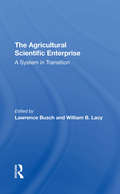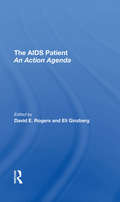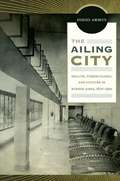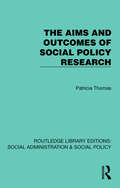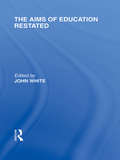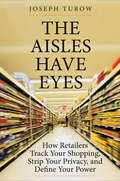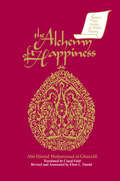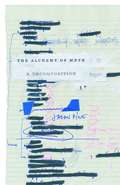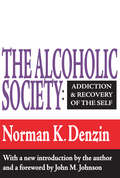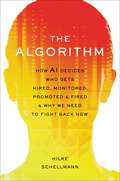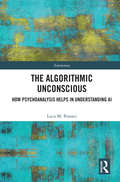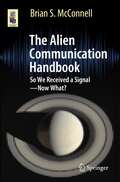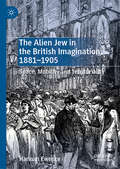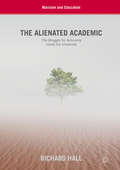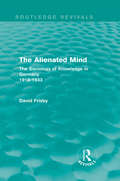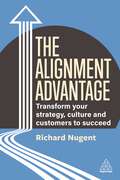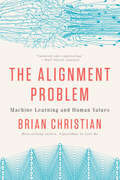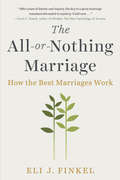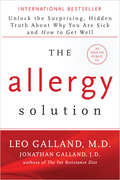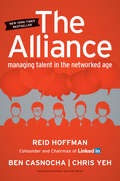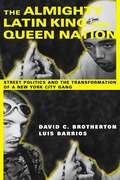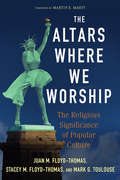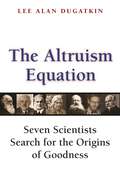- Table View
- List View
The Agricultural Scientific Enterprise: A System In Transition
by Lawrence M Busch William B LacyThe State Agricultural Experiment Stations have played a fundamental role in the development of science and agriculture in the United States. From their inception in 1887, the experiment stations have attempted to wed basic research with practical application and have helped institutionalize a utilitarian approach to agricultural science. Agricultural research and the new technology it helped to generate were major factors in the transformation of U.S. agriculture into a high technology, mechanized, science-based industry. Moreover, the experiment stations, as the first large-scale, publicly supported scientific research institutions in the United States, have also long been models for scientific institutions both here and abroad. Compiled for the 1987 centennial of the State Agricultural Experiment Stations, this volume critically examines past performance, current issues, and future directions for public agricultural research in the United States. Each of the authors, drawn from disciplines as diverse as philosophy and agronomy, focuses on a central concern for the scientific enterprise. Issues include priority setting, maintaining and promoting disciplinary and interdisciplinary effectiveness, supporting higher education for agriculture, and efficacious dissemination of research findings. By setting these issues in their historical and philosophical context, the volume suggests new approaches for meeting the continuing challenge to achieve equity, efficiency, sustainability, flexibility, conservation, and consistency with other objectives of U.S. society.
The Aids Patient: An Action Agenda
by Eli Ginzberg David E. RogersThis volume seeks a better understanding of the issues and options involved in the generation and transfer of technology to poor small farmers. It is intended to provide a fresh opportunity to develop guidelines for the future design and implementation of rural development investment projects.
The Ailing City: Health, Tuberculosis, and Culture in Buenos Aires, 1870-1950
by Diego ArmusFor decades, tuberculosis in Buenos Aires was more than a dangerous bacillus. It was also an anxious state of mind shaped not only by fears of contagion and death but also by broader social and cultural concerns. These worries included changing work routines, rapid urban growth and its consequences for housing and living conditions, efforts to build a healthy "national race," and shifting notions of normality and pathology. In The Ailing City, the historian Diego Armus explores the metaphors, state policies, and experiences associated with tuberculosis in Buenos Aires between 1870 and 1950. During those years, the disease was conspicuous and frightening, and biomedicine was unable to offer an effective cure. Against the background of the global history of tuberculosis, Armus focuses on the making and consolidation of medicalized urban life in the Argentine capital. He discusses the state's intrusion into private lives and the ways that those suffering from the disease accommodated and resisted official attempts to care for them and to reform and control their morality, sociability, sexuality, and daily habits. The Ailing City is based on an impressive array of sources, including literature, journalism, labor press, medical journals, tango lyrics, films, advertising, imagery, statistics, official reports, and oral history. It offers a unique perspective on the emergence of modernity in a cosmopolitan city on the periphery of world capitalism.
The Aims and Outcomes of Social Policy Research (Routledge Library Editions: Social Administration & Social Policy)
by Patricia ThomasOriginally published in 1985, this book investigates, through real cases, whether independently funded research which was intended to solve social problems has had the desired effect. It also inquires whether civil servants believe that research has a part to play in the formulation of policy. The researcher’s time scale is long and the policy maker’s is short. Does this conflict always mean that the results of research are produced long after policy has been decided and implemented? The book also examines the funders of social research who make up the third party in the uneasy relationship between social scientists and policy makers. This important study goes to the very heart of the debate about social research.
The Aims of Education Restated (International Library of the Philosophy of Education Volume 22)
by John WhiteJohn White's study is the most substantial work on what the aims of education should be since Whitehead's Aims of Education of 1929. It draws on material not only from schools and colleges, but also from the broader educative or miseducative nature of the 'ethos' of society and some of its major institutions. Sifting the different views about aims which are now prevalent and circulating in the world of education, he integrates the more defensible of them into an articulated set of positive recommendations. The study takes a broadly philosophical and non-technical stand; it is written to help practitioners orient themselves in what is often bewildering territory, at a time when the question of what the aims of education ought to be has acquired a new urgency for politicians and educational administrators, as well as for those directly involved in educational institutions, head teachers and their staff.
The Aisles Have Eyes: How Retailers Track Your Shopping, Strip Your Privacy, and Define Your Power
by Joseph TurowThe author of Media Today offers &“a trenchant, timely, and troubling account of [retailers&’] data-mining, in-store tracking, and predictive analytics&” (The Philadelphia Inquirer). By one expert&’s prediction, within twenty years half of Americans will have body implants that tell retailers how they feel about specific products as they browse their local stores. The notion may be outlandish, but it reflects executives&’ drive to understand shoppers in the aisles with the same obsessive detail that they track us online. In fact, a hidden surveillance revolution is already taking place inside brick-and-mortar stores, where Americans still do most of their buying. Drawing on his interviews with retail executives, analysis of trade publications, and experiences at insider industry meetings, advertising and digital studies expert Joseph Turow pulls back the curtain on these trends, showing how a new hyper-competitive generation of merchants—including Macy&’s, Target, and Walmart—is already using data mining, in-store tracking, and predictive analytics to change the way we buy, undermine our privacy, and define our reputations. Eye-opening and timely, Turow&’s book is essential reading to understand the future of shopping. &“Turow shows shopping today to be an exercise in unwitting self-revelation—and not only online.&”—The Wall Street Journal &“Thoroughly researched and clearly presented with detailed evidence and fascinating peeks inside the retail industry. Much of this information is startling and even chilling, particularly when Turow shows how retail data-tracking can enable discrimination and societal stratification.&”—Publishers Weekly &“Revealing . . . Valuable reading for shoppers and retailers alike.&”—Kirkus Reviews
The Alchemy of Happiness (Sources And Studies In World History Ser.)
by Abu Hamid Muhammad al-Ghazzali Elton D. Daniel Claud FieldAbu Hamid Muhammad al-Ghazzali (1058-1111) is one of the most important religious figures in Islamic history. He is particularly noted for his brilliant synthesis of mysticism and traditional Sunni Islam. Ghazzali's "The Alchemy of Happiness", written toward the end of his life, provides a succinct introduction to both the theory and practice of Sufism (Islamic mysticism). It thus offers many insights into traditional Muslim society. This translation is fully annotated for readers unfamiliar with Ghazzali and includes an introduction to his life and historical milieu.
The Alchemy of Meth: A Decomposition
by Jason PineMeth cooks practice late industrial alchemy—transforming base materials, like lithium batteries and camping fuel, into gold Meth alchemists all over the United States tap the occulted potencies of industrial chemical and big pharma products to try to cure the ills of precarious living: underemployment, insecurity, and the feeling of idleness. Meth fires up your attention and makes repetitive tasks pleasurable, whether it&’s factory work or tinkering at home. Users are awake for days and feel exuberant and invincible. In one person&’s words, they &“get more life.&” The Alchemy of Meth is a nonfiction storybook about St. Jude County, Missouri, a place in decomposition, where the toxic inheritance of deindustrialization meets the violent hope of this drug-making cottage industry. Jason Pine bases the book on fieldwork among meth cooks, recovery professionals, pastors, public defenders, narcotics agents, and pharmaceutical executives. Here, St. Jude is not reduced to its meth problem but Pine looks at meth through materials, landscapes, and institutions: the sprawling context that makes methlabs possible. The Alchemy of Meth connects DIY methlabs to big pharma&’s superlabs, illicit speed to the legalized speed sold as ADHD medication, uniquely implicating the author&’s own story in the narrative. By the end of the book, the backdrop of St. Jude becomes the foreground. It could be a story about life and work anywhere in the United States, where it seems no one is truly clean and all are complicit in the exploitation of their precious resources in exchange for a livable present—or even the hope of a future.
The Alcoholic Society: Addiction and Recovery of the Self
by Reece McGeeOffering a unique theoretical foundation to understanding the lived experience of the active alcoholic, Denzin asserts that alcoholism is a disease in which negative emotions divide the self into warring, inner factions, fueled and distorted by alcoholic intoxication. The work is solidly anchored in a long-term study of the socialization experiences that began in alcoholism treatment centers and continue in Alcoholics Anonymous recovery programs. It covers the treatment process, the restructuring of self, the alcoholic's interaction with his recovery treatment program, and the modalities of self-transcendence that result from treatment.
The Algorithm: How AI Decides Who Gets Hired, Monitored, Promoted, and Fired and Why We Need to Fight Back Now
by Hilke SchellmannBased on exclusive information from whistleblowers, internal documents, and real world test results, Emmy‑award winning Wall Street Journal contributor Hilke Schellmann delivers a shocking and illuminating expose on the next civil rights issue of our time: how AI has already taken over the workplace and shapes our future. Hilke Schellmann, is an Emmy‑award winning investigative reporter, Wall Street Journal and Guardian contributor and Journalism Professor at NYU. In The Algorithm, she investigates the rise of artificial intelligence (AI) in the world of work. AI is now being used to decide who has access to an education, who gets hired, who gets fired, and who receives a promotion. Drawing on exclusive information from whistleblowers, internal documents and real‑world tests, Schellmann discovers that many of the algorithms making high‑stakes decisions are biased, racist, and do more harm than good. Algorithms are on the brink of dominating our lives and threaten our human future—if we don't fight back. Schellmann takes readers on a journalistic detective story testing algorithms that have secretly analyzed job candidates' facial expressions and tone of voice. She investigates algorithms that scan our online activity including Twitter and LinkedIn to construct personality profiles à la Cambridge Analytica. Her reporting reveals how employers track the location of their employees, the keystrokes they make, access everything on their screens and, during meetings, analyze group discussions to diagnose problems in a team. Even universities are now using predictive analytics for admission offers and financial aid.
The Algorithmic Unconscious: How Psychoanalysis Helps in Understanding AI (Antinomies)
by Luca M. PossatiThis book applies the concepts and methods of psychoanalysis to the study of artificial intelligence (AI) and human–AI interaction. It develops a new, more fruitful approach for applying psychoanalysis to AI and machine behavior. It appeals to a broad range of scholars: philosophers working on psychoanalysis, technology, AI ethics, and cognitive sciences, psychoanalysts, psychologists, and computer scientists. The book is divided into four parts. The first part (Chapter 1) analyzes the concept of "machine behavior." The second part (Chapter 2) develops a reinterpretation of some fundamental Freudian and Lacanian concepts through Bruno Latour’s actor-network theory. The third part (Chapters 3 and 4) focuses on the nature and structure of the algorithmic unconscious. The author claims that the unconscious roots of AI lie in a form of projective identification, i.e., an emotional and imaginative exchange between humans and machines. In the fourth part of the book (Chapter 5), the author advances the thesis that neuropsychoanalysis and the affective neurosciences can provide a new paradigm for research on artificial general intelligence. The Algorithmic Unconscious explores a completely new approach to AI, which can also be defined as a form of "therapy." Analyzing the projective identification processes that take place in groups of professional programmers and designers, as well as the "hidden" features of AI (errors, noise information, biases, etc.), represents an important tool to enable a healthy and positive relationship between humans and AI. Psychoanalysis is used as a critical space for reflection, innovation, and progress.
The Alien Communication Handbook: So We Received a Signal—Now What? (Astronomers' Universe)
by Brian S. McConnellScientists have been searching for signals from extraterrestrial civilizations since Frank Drake’s first radio survey in 1960. But what would actually happen if SETI’s search succeeds? Is there any way we could even make sense of the signal we receive? Written by an expert in communication systems and translation technology, this book explores the science of interstellar communication. It explains how this process may unfold, how an ET communication link would work, the types of information it could convey and how professionals, amateurs and ordinary people like you would participate in the effort to understand what another civilization has to say. Along the way, the book introduces readers to many aspects of modern-day communication systems and computing. Featured as well are dozens of illustrations, photos and real-world examples, rounding out this compelling foray into the mechanics of interstellar communication. “Scientists, policy makers, and all interested in the likely future discovery of alien life will want to read this book.” - Steven J. Dick, Former NASA Chief Historian
The Alien Jew in the British Imagination, 1881–1905: Space, Mobility and Territoriality
by Hannah EwenceThis book explores how fin de siècle Britain and Britons displaced spatially-charged apprehensions about imperial decline, urban decay and unpoliced borders onto Jews from Eastern Europe migrating westwards. The myriad of representations of the ‘alien Jew’ that emerged were the product of, but also a catalyst for, a decisive moment in Britain’s legal history: the fight for the 1905 Aliens Act. Drawing upon a richly diverse collection of social and political commentary, including fiction, political testimony, ethnography, travel writing, journalism and cartography, this volume traces the shifting rhetoric around alien Jews as they journeyed from the Russian Pale of Settlement to London’s East End. By employing a unique and innovative reading of both the aliens debate and racialized discourse concerned with ‘the Jew’, Hannah Ewence demonstrates that ideas about ‘space’ and 'place’ critically informed how migrants were viewed; an argument which remains valid in today’s world.
The Alienated Academic: The Struggle for Autonomy Inside the University (Marxism and Education)
by Richard HallHigher education is increasingly unable to engage usefully with global emergencies, as its functions are repurposed for value. Discourses of entrepreneurship, impact and excellence, realised through competition and the market, mean that academics and students are increasingly alienated from themselves and their work. This book applies Marx’s concept of alienation to the realities of academic life in the Global North, in order to explore how the idea of public education is subsumed under the law of value. In a landscape of increased commodification of higher education, the book explores the relationship between alienation and crisis, before analysing how academic knowledge, work, identity and life are themselves alienated. Finally, it argues that through indignant struggle, another world is possible, grounded in alternative forms of organising life and producing socially-useful knowledge, ultimately requiring the abolition of academic labour. This pioneering work will be of interest and value to all those working in the higher education sector, as well as those concerned with the rise of neoliberalism and marketization within universities.
The Alienated Mind: The Sociology of Knowledge in Germany 1918-1933 (Routledge Revivals)
by David FrisbyThis book, first published in 1983, with a second edition in 1992, investigates the emergence of the sociology of knowledge in Germany in the critical period from 1918 to 1933. These years witnessed the development of distinctive paradigms centred on the works of Max Scheler, Georg Lukács and Karl Mannheim. Each theorist sought to confront the base-superstructure models of the relationship between knowledge and society, which originated in Orthodox Marxism. David Frisbsy illustrates how these and other themes in the sociology of knowledge were contested through a detailed account of the central sociological debates in Weimar Germany. This reissue of The Alienated Mind will be of particular interest to students and academics concerned with the development of an important tradition in the sociology of knowledge and culture, social theory and German history.
The Alignment Advantage: Transform Your Strategy, Culture and Customers to Succeed
by Richard NugentStrategy, culture and customers are the key elements of any business. But to truly succeed, they need to be effectively built, refined and aligned.Studies show that organizations which are highly aligned are 72% more profitable than their competition. The Alignment Advantage shows how you can achieve this through a practical and proven framework which can be adapted to all businesses, whether it's a small start-up, multinational organization or somewhere in between.Arguing that Simon Sinek's "start with why" approach is compelling yet flawed and Peter Drucker's claim that "culture eats strategy for breakfast" is a myth, Richard Nugent creates a clear, accessible blueprint for a more successful, collaborative and efficient organization. Illustrated with fascinating case studies from the likes of LEGOLAND, Wagamama and The Empire State Building, The Alignment Advantage cuts through organizational silos and inter-departmental tensions to provide an aligned and strategic approach that will allow you to build your success, refine your processes and align your efforts to target your customers and clients.
The Alignment Problem: Machine Learning And Human Values
by Brian ChristianA jaw-dropping exploration of everything that goes wrong when we build AI systems and the movement to fix them. Today’s “machine-learning” systems, trained by data, are so effective that we’ve invited them to see and hear for us—and to make decisions on our behalf. But alarm bells are ringing. Recent years have seen an eruption of concern as the field of machine learning advances. When the systems we attempt to teach will not, in the end, do what we want or what we expect, ethical and potentially existential risks emerge. Researchers call this the alignment problem. Systems cull résumés until, years later, we discover that they have inherent gender biases. Algorithms decide bail and parole—and appear to assess Black and White defendants differently. We can no longer assume that our mortgage application, or even our medical tests, will be seen by human eyes. And as autonomous vehicles share our streets, we are increasingly putting our lives in their hands. The mathematical and computational models driving these changes range in complexity from something that can fit on a spreadsheet to a complex system that might credibly be called “artificial intelligence.” They are steadily replacing both human judgment and explicitly programmed software. In best-selling author Brian Christian’s riveting account, we meet the alignment problem’s “first-responders,” and learn their ambitious plan to solve it before our hands are completely off the wheel. In a masterful blend of history and on-the ground reporting, Christian traces the explosive growth in the field of machine learning and surveys its current, sprawling frontier. Readers encounter a discipline finding its legs amid exhilarating and sometimes terrifying progress. Whether they—and we—succeed or fail in solving the alignment problem will be a defining human story. The Alignment Problem offers an unflinching reckoning with humanity’s biases and blind spots, our own unstated assumptions and often contradictory goals. A dazzlingly interdisciplinary work, it takes a hard look not only at our technology but at our culture—and finds a story by turns harrowing and hopeful.
The All-or-Nothing Marriage: How the Best Marriages Work
by Eli J Finkel“After years of debate and inquiry, the key to a great marriage remained shrouded in mystery. Until now...”—Carol Dweck, author of Mindset: The New Psychology of SuccessEli J. Finkel's insightful and ground-breaking investigation of marriage clearly shows that the best marriages today are better than the best marriages of earlier eras. Indeed, they are the best marriages the world has ever known. He presents his findings here for the first time in this lucid, inspiring guide to modern marital bliss.The All-or-Nothing Marriage reverse engineers fulfilling marriages—from the “traditional” to the utterly nontraditional—and shows how any marriage can be better.The primary function of marriage from 1620 to 1850 was food, shelter, and protection from violence; from 1850 to 1965, the purpose revolved around love and companionship. But today, a new kind of marraige has emerged, one oriented toward self-discover, self-esteem, and personal growth. Finkel combines cutting-edge scientific research with practical advice; he considers paths to better communication and responsiveness; he offers guidance on when to recalibrate our expectations; and he even introduces a set of must-try “lovehacks.”This is a book for the newlywed to the empty nester, for those thinking about getting married or remarried, and for anyone looking for illuminating advice that will make a real difference to getting the most out of marriage today.
The Allergy Solution: Unlock The Surprising, Hidden Truth About Why You Are Sick And How To Get Well
by Leo Galland Jonathan Galland J. D.An epidemic of allergies is spreading around the world. One billion people suffer from allergic diseases such as asthma, hay fever, eczema, and food allergies. But this is just the tip of the iceberg. In this groundbreaking book, award-winning doctor Leo Galland, M.D., reveals the shocking rise of hidden allergies that lead to weight gain, fatigue, brain fog, depression, joint pain, headaches, ADHD, digestive problems, and much more. Astonishing new research shows how each of these is linked to the immune imbalance that is at the root of allergy. A brilliant clinician, Dr. Galland has unlocked the power of this breakthrough science to help thousands of patients who have struggled with mysterious symptoms answer the question: "Doctor, what’s wrong with me?" Here, he is joined by his son, Jonathan Galland, J.D., a passionate health writer and environmental advocate, in exposing the truth that just as the earth’s environment is out of balance, our bodies are out of balance. The modern world, with pollution, unhealthy eating habits, lack of exercise, and excessive exposure to antibiotics, is fueling the rise in allergies. The Allergy Solution takes an in-depth look at how we can balance immunity through nutrition and lifestyle to reverse allergies without drugs. It offers an easy nutritional program, starting with a Three-Day Power Wash designed to "clear the tracks," to help us take back control. Do you suffer from asthma, eczema, or sinusitis? Are you sick of pain, fatigue, brain fog, weight gain, depression, anxiety, or wondering what is behind your mysterious symptoms? Let Dr. Galland’s clinical experience and unique insights into cutting-edge science guide you back to health.
The Alliance
by Reid Hoffman Ben Casnocha Chris YehIntroducing the new, realistic loyalty pact between employer and employeeThe employer-employee relationship is broken, and managers face a seemingly impossible dilemma: the old model of guaranteed long-term employment no longer works in a business environment defined by continuous change, but neither does a system in which every employee acts like a free agent.The solution? Stop thinking of employees as either family or as free agents. Think of them instead as allies.As a manager you want your employees to help transform the company for the future. And your employees want the company to help transform their careers for the long term. But this win-win scenario will happen only if both sides trust each other enough to commit to mutual investment and mutual benefit. Sadly, trust in the business world is hovering at an all-time low.We can rebuild that lost trust with straight talk that recognizes the realities of the modern economy. So, paradoxically, the alliance begins with managers acknowledging that great employees might leave the company, and with employees being honest about their own career aspirations.By putting this new alliance at the heart of your talent management strategy, you'll not only bring back trust, you'll be able to recruit and retain the entrepreneurial individuals you need to adapt to a fast-changing world. These individuals, flexible, creative, and with a bias toward action, thrive when they're on a specific "tour of duty"-when they have a mission that's mutually beneficial to employee and company that can be completed in a realistic period of time.Coauthored by the founder of LinkedIn, this bold but practical guide for managers and executives will give you the tools you need to recruit, manage, and retain the kind of employees who will make your company thrive in today's world of constant innovation and fast-paced change.
The Alliance: Managing Talent in the Networked Age
by Reid Hoffman Ben Casnocha Chris YehA New York Times Bestseller Introducing the new, realistic loyalty pact between employer and employee. The employer-employee relationship is broken, and managers face a seemingly impossible dilemma: the old model of guaranteed long-term employment no longer works in a business environment defined by continuous change, but neither does a system in which every employee acts like a free agent. The solution? Stop thinking of employees as either family or as free agents. Think of them instead as allies. As a manager you want your employees to help transform the company for the future. And your employees want the company to help transform their careers for the long term. But this win-win scenario will happen only if both sides trust each other enough to commit to mutual investment and mutual benefit. Sadly, trust in the business world is hovering at an all-time low. We can rebuild that lost trust with straight talk that recognizes the realities of the modern economy. So, paradoxically, the alliance begins with managers acknowledging that great employees might leave the company, and with employees being honest about their own career aspirations. By putting this new alliance at the heart of your talent management strategy, you’ll not only bring back trust, you’ll be able to recruit and retain the entrepreneurial individuals you need to adapt to a fast-changing world. These individuals, flexible, creative, and with a bias toward action, thrive when they’re on a specific "tour of duty”-when they have a mission that’s mutually beneficial to employee and company that can be completed in a realistic period of time. Coauthored by the founder of LinkedIn, this bold but practical guide for managers and executives will give you the tools you need to recruit, manage, and retain the kind of employees who will make your company thrive in today’s world of constant innovation and fast-paced change.
The Alliance: Managing Talent in the Networked Age
by Reid Hoffman Ben Casnocha Chris YehA New York Times Bestseller Introducing the new, realistic loyalty pact between employer and employee. The employer-employee relationship is broken, and managers face a seemingly impossible dilemma: the old model of guaranteed long-term employment no longer works in a business environment defined by continuous change, but neither does a system in which every employee acts like a free agent. The solution? Stop thinking of employees as either family or as free agents. Think of them instead as allies. As a manager you want your employees to help transform the company for the future. And your employees want the company to help transform their careers for the long term. But this win-win scenario will happen only if both sides trust each other enough to commit to mutual investment and mutual benefit. Sadly, trust in the business world is hovering at an all-time low. We can rebuild that lost trust with straight talk that recognizes the realities of the modern economy. So, paradoxically, the alliance begins with managers acknowledging that great employees might leave the company, and with employees being honest about their own career aspirations. By putting this new alliance at the heart of your talent management strategy, you’ll not only bring back trust, you’ll be able to recruit and retain the entrepreneurial individuals you need to adapt to a fast-changing world. These individuals, flexible, creative, and with a bias toward action, thrive when they’re on a specific "tour of duty”-when they have a mission that’s mutually beneficial to employee and company that can be completed in a realistic period of time. Coauthored by the founder of LinkedIn, this bold but practical guide for managers and executives will give you the tools you need to recruit, manage, and retain the kind of employees who will make your company thrive in today’s world of constant innovation and fast-paced change.
The Almighty Latin King and Queen Nation: Street Politics and the Transformation of a New York City Gang
by David C. Brotherton Luis BarriosFrom Los Angeles and New York to Chicago and Miami, street gangs are regarded as one of the most intractable crime problems facing our cities, and a vast array of resources is being deployed to combat them. This book chronicles the astounding self-transformation of one of the most feared gangs in the United States into a social movement acting on behalf of the dispossessed, renouncing violence and the underground economy, and requiring school attendance for membership. <P><P>What caused the Almighty Latin King and Queen Nation of New York City to make this remarkable transformation? And why has it not happened to other gangs elsewhere? David C. Brotherton and Luis Barrios were given unprecedented access to new and never-before-published material by and about the Latin Kings and Queens, including the group's handbook, letters written by members, poems, rap songs, and prayers. In addition, they interviewed more than one hundred gang members, including such leaders as King Tone and King Hector. Featuring numerous photographs by award-winning photojournalist Steve Hart, the book explains the symbolic significance for the gang of hand gestures, attire, rituals, and rites of passage. Based on their inside information, the authors craft a unique portrait of the lives of the gang members and a ground-breaking study of their evolution.
The Altars Where We Worship: The Religious Significance Of Popular Culture
by Juan M. Floyd-Thomas Stacey M. Floyd-Thomas Mark G. ToulouseWhile a large percentage of Americans claim religious identity, the number of Americans attending traditional worship services has significantly declined in recent decades. Where, then, are Americans finding meaning in their lives, if not in the context of traditional religion? In this provocative study, the authors argue that the objects of our attention have become our god and fulfilling our desires has become our religion. They examine the religious dimensions of six specific aspects of American culture—body and sex, big business, entertainment, politics, sports, and science and technology—that function as "altars" where Americans gather to worship and produce meaning for their lives. The Altars Where We Worship shows how these secular altars provide resources for understanding the self, others, and the world itself. "For better or worse," the authors write, "we are faced with the reality that human experiences before these altars contain religious characteristics in common with experiences before more traditional altars." Readers will come away with a clearer understanding of what religion is after exploring the thoroughly religious aspects of popular culture in the United States.
The Altruism Equation: Seven Scientists Search for the Origins of Goodness
by Lee Alan DugatkinIn a world supposedly governed by ruthless survival of the fittest, why do we see acts of goodness in both animals and humans? This problem plagued Charles Darwin in the 1850s as he developed his theory of evolution through natural selection. Indeed, Darwin worried that the goodness he observed in nature could be the Achilles heel of his theory. Ever since then, scientists and other thinkers have engaged in a fierce debate about the origins of goodness that has dragged politics, philosophy, and religion into what remains a major question for evolutionary biology.The Altruism Equation traces the history of this debate from Darwin to the present through an extraordinary cast of characters-from the Russian prince Petr Kropotkin, who wanted to base society on altruism, to the brilliant biologist George Price, who fell into poverty and succumbed to suicide as he obsessed over the problem. In a final surprising turn, William Hamilton, the scientist who came up with the equation that reduced altruism to the cold language of natural selection, desperately hoped that his theory did not apply to humans.Hamilton's Rule, which states that relatives are worth helping in direct proportion to their blood relatedness, is as fundamental to evolutionary biology as Newton's laws of motion are to physics. But even today, decades after its formulation, Hamilton's Rule is still hotly debated among those who cannot accept that goodness can be explained by a simple mathematical formula. For the first time, Lee Alan Dugatkin brings to life the people, the issues, and the passions that have surrounded the altruism debate. Readers will be swept along by this fast-paced tale of history, biography, and scientific discovery.
